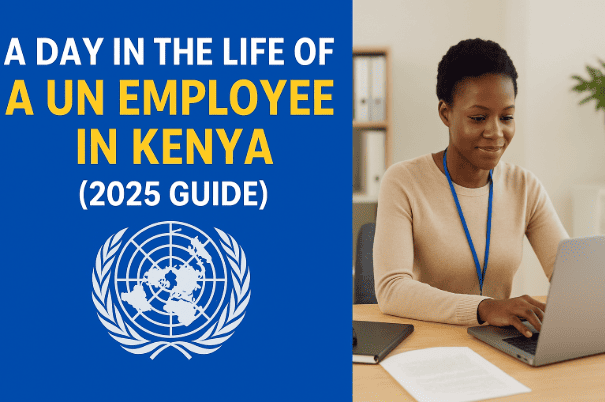⭐ Introduction
Imagine waking up each morning knowing that your work directly supports global peace, humanitarian assistance, and sustainable development. This is the everyday reality for thousands of professionals working with the United Nations (UN) in Kenya.
Whether you’re planning a UN career or simply curious about the work culture, this guide gives you an inside look into:
- 👩💼 Daily routines
- 🏢 Work environment
- 🤝 Collaboration and teamwork
- 🎯 Roles and responsibilities
- 🌱 Career opportunities
- 📌 Real challenges and rewards
🏛️ 1. Overview of the United Nations in Kenya
The United Nations has been active in Kenya since 1963, playing a key role in peacekeeping, humanitarian aid, environmental protection, and socio-economic development.
🔹 Major UN Agencies Based in Kenya
Here are the most active and impactful UN bodies operating in the country:
- UNICEF – 👶 Supports child protection, health, and education.
- UNHCR – 🏚️ Offers protection and support to refugees and displaced persons.
- UNDP – 📈 Leads poverty reduction, governance, and sustainable development initiatives.
- WHO – 🏥 Strengthens public health, disease prevention, and medical systems.
⏰ 2. Daily Routine of a UN Employee
🌅 Morning Preparation
A typical UN workday in Kenya starts early. Most employees begin with:
- Checking emails 📧
- Reviewing project updates
- Team briefs and departmental planning
🕘 Work Hours & Structure
Although standard office hours follow a 9 AM – 5 PM schedule, flexibility is essential due to:
- Urgent field assignments
- Crisis response
- International coordination
🧩 Common Daily Tasks
Program Managers
- Project planning & strategy
- Budget oversight
- Coordination with partners
Field Officers
- On-ground assessments
- Data collection
- Supporting local communities
Administrative Staff
- Logistics & scheduling
- Documentation and reporting
- Office coordination
🏢 3. Work Environment & Organizational Culture
🌍 Professional & Dynamic Workspaces
UN offices in Kenya—especially in Nairobi—are modern, well-equipped, and highly collaborative. Employees may also travel to:
- Remote areas
- Refugee camps
- Rural community development zones
🤝 Culture of Diversity and Respect
The UN’s core values include:
- Integrity
- Professionalism
- Respect for diversity
Employees come from different nationalities, cultures, and backgrounds, creating a uniquely global work setting.
👥 Teamwork at the Core
Cross-agency teamwork is not optional—it’s essential. Staff frequently collaborate with:
- Government ministries
- NGOs
- International agencies
- Local communities
🎯 4. Specific Roles & What They Do
Below is a closer look at commonly found roles within the UN system in Kenya.
4.1 Program Managers
What They Do:
- Develop and implement new programs
- Manage large project funds
- Monitor progress and impact
- Meet with donors and government partners
Challenges:
- Managing multiple partners
- Tight funding cycles
- High accountability standards
4.2 Field Officers
What They Do:
- Travel to project sites
- Conduct assessments
- Document needs and progress
- Support vulnerable populations
Challenges:
- Tough terrain
- Emergency response situations
- High-pressure environments
4.3 Administrative Staff
What They Do:
- Scheduling & organizing meetings
- Maintaining records
- Supporting HR, finance & operations
Challenges:
- Multitasking
- Strict compliance procedures
🌟 5. Impact & Success Stories
The UN’s presence in Kenya has led to life-changing transformations, such as:
- 🚰 Providing clean drinking water in rural communities
- 🎒 Supporting education for vulnerable children
- 🏥 Delivering emergency healthcare during crises
- 🕊️ Supporting peace and reconciliation programs
Real Employee Experiences
UN workers often describe their jobs as deeply meaningful. Many highlight the satisfaction of seeing lives transformed because of their efforts.
⚖️ 6. Challenges & Rewards
⚠️ Common Challenges
- Working in unstable political environments
- Limited resources during emergencies
- Navigating remote and risky areas
- Heavy workloads
🏆 The Rewards Make It Worth It
- Helping change lives
- Working with brilliant minds from around the world
- Growing personally and professionally
- Creating long-lasting community impact
“The work is tough, but the impact is powerful.”
🚀 7. Career Path & Growth Opportunities
📌 Career Progression Paths
Employees can grow from entry-level officers to:
- Senior advisors
- Program directors
- UN country representatives
📚 Training & Professional Development
Training programs include:
- Leadership workshops
- International conferences
- Technical skill-building courses
💡 Tips for Aspiring UN Applicants
- Gain experience in NGOs, development, or humanitarian work
- Build strong communication & analytical skills
- Stay updated on global issues
- Network with UN professionals
- Understand and embrace UN values
📝 Conclusion
Working at the United Nations in Kenya is more than just a job—it’s a mission. From exciting daily routines to meaningful impact on communities, UN careers offer unmatched professional and personal fulfillment.
If you’re passionate about global peace, development, and humanitarian work, the UN could be your perfect career path.
👉 Call to Action
Visit the UN Careers Portal to explore job openings, internships, and volunteer programs.
Stay connected with our blog for more UN career guides, tips, and insider stories.
❓ FAQs — United Nations Jobs in Kenya
1. What is a typical day like for a UN employee?
A day includes team briefings, project planning, fieldwork, meetings, and reporting. Flexibility is essential.
2. Which UN agencies operate in Kenya?
UNICEF, UNHCR, UNDP, WHO, WFP, UNEP, and others.
3. What is the work environment like?
Modern offices, diverse teams, and frequent field visits.
4. What values guide UN work culture?
Integrity, professionalism, diversity, and teamwork.
5. Common UN roles in Kenya?
Program Managers, Field Officers, Administrative Staff, Technical Experts, HR, Finance Officers.
6. Challenges faced by UN employees?
Remote locations, crisis response, high workload, limited resources.
7. Rewards of working with the UN?
Global impact, diverse teams, competitive benefits, personal growth.
8. What career growth options exist?
Staff can progress from assistant roles to senior management and regional leadership.
9. Does the UN offer training?
Yes—leadership, technical, and professional development programs.
10. How to prepare for a UN career?
Build experience, strengthen skills, and learn about global humanitarian and development issues.
